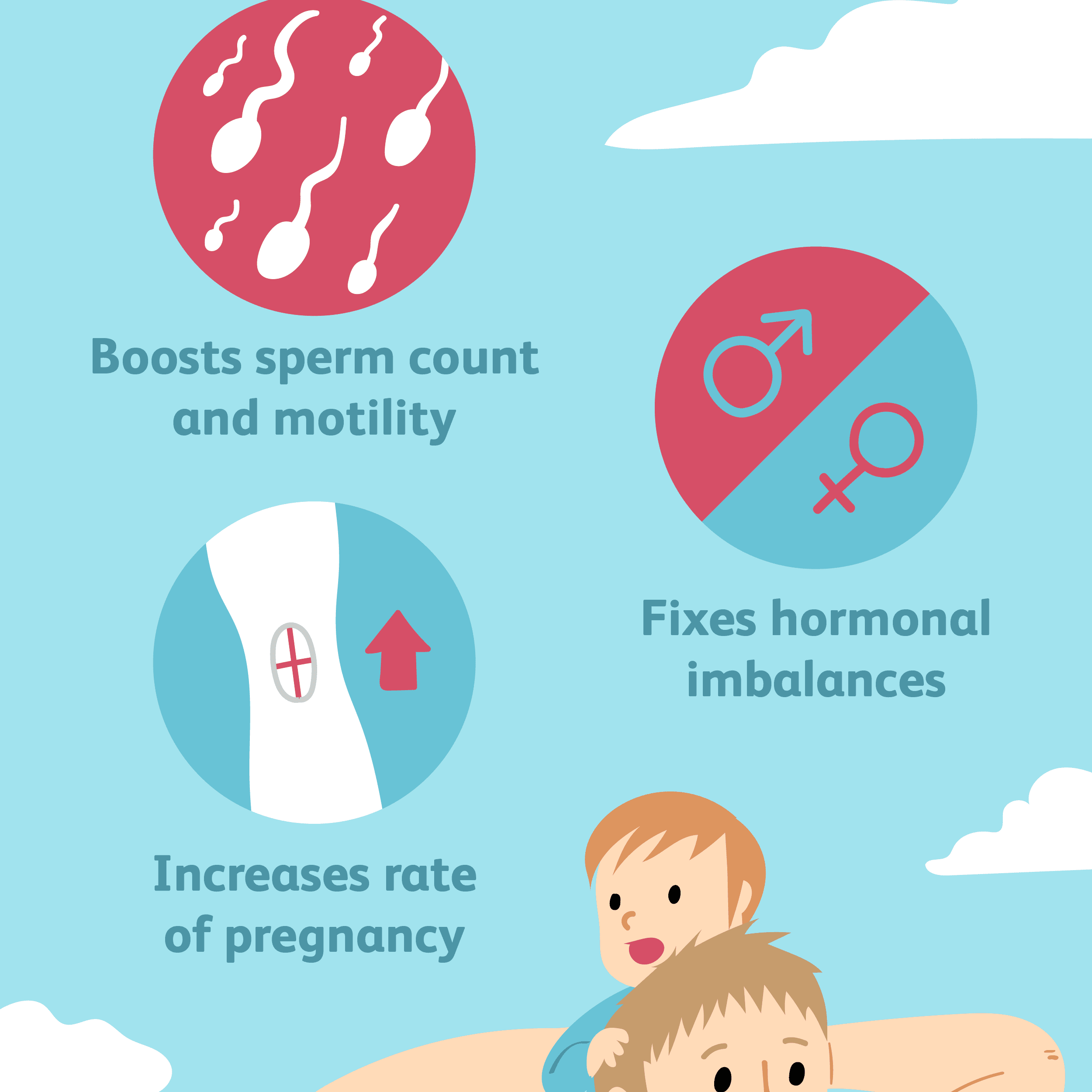Clomid For Men- Is It Worth Taking?
Clomid for men is considered to increase fertility in men and has some other benefits too. Clomid is the previous brand name of a drug called clomiphene citrate used by doctors to treat fertility in women. Sometimes, Clomid might also be prescribed for men facing infertility issues.
The U.S FDA (Food and drug administration) recommended this oral fertility medication for its use in women who had problems being pregnant. It works by affecting the hormone balance in the body and increases ovulation.
The FDA approved Clomid to be used for women only. But sometimes it may be prescribed off-label as an infertility treatment in men. If you want to know more if Clomid for men is useful or not, read everything!
How Clomid Works?

Clomid works by blocking the hormone estrogen from communicating with our pituitary gland. When estrogen communicates with the pituitary gland, FSH (follicle-stimulating hormone) and LH (luteinizing hormone) are released.
When these hormones are released, it leads to decreased levels of testosterone and decreased production sperms in the body. Because Clomid works by blocking the estrogen’s combination with the pituitary gland, there is always an increase in other hormones like FSH, LH, and testosterone in your body.
Optimal dosing of Clomid for men has not been established yet. The dose is given based on the condition can vary from 12.5 to 400 mg per day. A recent study has suggested starting dose of just 25 mg of Clomid for men. The dose is given every three days or every week and then adjusted slowly until it reaches 50 mg per day as needed.
A higher dosage of Clomid for men might have a negative impact on the count of sperm and its motility. Always ask your healthcare provider to ensure you are given a proper dosage.
Infertility In Men
Clomid is prescribed as an off-label medication for infertility in men especially where low testosterone levels are seen. As per the Centers For Disease Control and Prevention, male and female factors, both are identified in nearly 35% of couples who face difficulties trying to conceive. In nearly 8% of couples, malefactors are identified.
Many things are responsible for male infertility. These are:
- Age
- Obesity or being overweight.
- Injuries in the testicles
- Heavy use of cigarettes, anabolic steroids, and alcohol.
- Hormonal imbalance as a result of improper function of pituitary glands or exposure to estrogen or testosterone.
- Medical conditions like cystic fibrosis, diabetes, and types of autoimmune diseases.
- Treatment of cancer involving few types of radiation and chemotherapies.
- Varicoceles, are enlarged veins that may result in the testicles overheating.
- genetic disorders like Klinefelter syndrome or microdeletion in the Y chromosome.
If the doctors suspect infertility in males, they will order analysis for their semen. A sample of semen is used to assess the sperm count as well as the shape and movement of sperm.
Side effects Of Clomid For Men
There are always side effects of medications. Few controlled studies of Clomid in men suggest possible side effects due to changes induced in hormones. These may include:
- Irritability
- tenderness in the pectoral muscles
- Acne
- the accelerated rate of prostate cancer growth if already cancer is persistent.
- The vision changes as the pituitary gland swells, however, this condition is rare.
The side effects of Clomid are typically reversible once the medications are stopped. If you witness any of the side effects given above after consuming Clomid, you have to discontinue the medication and seek treatment from the healthcare providers.
Efficacy for fertility
Regarding the efficacy or effectiveness of Clomid for men, its use still caused mixed results in males consuming it as per a study. Some of the studies that demonstrated moderate improvement or result in the count of sperm in males previously having low sperm count had unexplained infertility issues.
Other studies conducted with the same had shown no improvements when compared to either untreated control or a placebo. This was seen and considered true especially when using Clomid for pregnancy outcomes.
Another study conducted recently had shown an elevated rate in pregnancies while infertile males used a combination of Clomid along with vitamin E supplements when compared to placebo.
However, this study did not compare the vitamin E/Clomid group with the ones that used Clomid alone. As a result, this study was not able to gain information regarding if combing vitamin E with Clomid would increase its efficacy or not.
In another study from 2015, Researchers divided various members diagnosed with male infertility into 3 separate groups. These groups were as follows:
- Group A- It included participants that took only Vitamin E.
- Group B- This included participants using only Clomid.
- Grop C- This included participants using Vitamin E with Clomid.
The results of this study showed an elevation in the average concentration of sperms across all the groups. Group C was known to show the highest increase in sperm count. Group A was the second-highest. However, this study was limited, the limitation was no placebo, the small size of samples used, absence of pregnancy rates among all 3 groups.
Another study suggested that the most likely type of people that may benefit from using Clomid are the one in males with both normal to the below-average rate of sperm shape and motility and unexplained infertility. It is also considered that males in the population can use Clomid to reach a certain sperm count that would make them good enough applicants for the artificial insemination process.
When Do Doctors Prescribe Clomid For Men?
Doctors choose to recommend and prescribe a medication off-label like Clomid for men when they believe that the benefits of that drug can outweigh the risks. Though the FDA has approved the use of Clomid or clomiphene citrate for infertility in females only. doctors do prescribe it for males.
Clomid for men can be also used if the infertility issues are not examples and when other treatments had shown no results. However, the doctor needs to explain the effectiveness and safety of the drug are still not very well known. All the potential risks must be understood before using Clomid for men.
Causes of Infertility and medications used.

You have already read that using Clomid for men has mixed results as per researchers. Some causes of infertility in males and the medications provided respectively are as follows:
- If the cause of male infertility is hyperprolactinemia, a condition in which the body produced too much prolactin hormone, then the medications prescribed by the doctors include dopamine agonists like bromocriptine.
- When the cause of infertility is hypogonadotropic hypogonadism (this is when the testicles are not able to release testosterone), the mediations prescribed include medicines having gonadotropin-releasing hormones.
- When the cause of infertility in men is the high level of reactive oxygen molecules inside the sperm, the treatment or medications sued are selenium supplements and vitamin E.
- If the cause of infertility in males is retrograde ejaculation (it occurs when the flow of semen is backward inside the bladder), the medications prescribed are decongestant medicines such as pseudoephedrine.
Know that you have to visit a doctor and the doctors will prescribe medications after a proper diagnosis. Do not use over-the-counter treatments and medications without a reception and diagnosis by a professional healthcare provider.
Some Other Treatments For Infertility In Men
Clomid for men can or cannot be useful based on many conditions. Depending upon the causes, infertility in men may be treated using other methods too. These include:
1. Medications
There are many other medications too available that your healthcare provider can prescribe or recommend for balancing the hormones thus resulting in increased sperm count. These drugs or medications also help increase the amount of testosterone (male hormones) and decrease the to female hormones, that is estrogen in the body.
Two main drugs include:
- Human chorionic gonadotropin- hCG is usually given in the form of injections and it stimulates the testes to produce or generate more testosterone.
- Anastrozole or Arimidex- It is a drug that was mainly developed for breast cancer n females. It also helps prevent testosterone in males from being concerned with female hormones inside the body.
2. Surgery
If there is a blockage that is preventing the transportation of sperms in your body, the doctors might also recommend surgery to repair the issue completely. Surgery also helps to correct varicoceles.
Surgery is recommended when the causes of infertility in men are the following:
- Swollen veins or varicoceles in the testicles. The treatment involves performing minor surgery.
- Azoospermia condition occurs an individual has very little sperms in their semen concentration. The treatment used is surgical sperm retrieval. It uses small needles to accumulate sperms from testicles to be used in IVF.
- Blockage in the ejaculatory ducts prevents the ejaculation of sperms. The treatment involves making a small incision in the ejaculatory duct to unblock it.
3. Artifical Insemiantion
This treatment is slightly different. Special preparation of sperms into the uterus takes place. Before carrying out artificial insemination, the mother might take some medications that help promote ovulation to increase the chances of fertilization. This has been very successful in parents that had problems with giving birth.
4. In Vitro Fertilisation or IVF

IVF or in vitro fertilization involves handling the eggs released after ovulation and the fertilized embryo as a result of that outside of the body in lab conditions. Eggs are removed from ovaries using a needle. These are then combined with the terms in artificial lab conditions. The resulting embryo thus formed is returned into the mother’s body.
A specific type of IVF known as Intracytoplasmic Sperm Injection or ICSI may be used when the issue is with male fertility. ICSI involves only injecting a single sperm into the mother’s egg.
The Bottom Line
Clomid for men is typically used to increase fertility. It is however not approved by the FDA to be used for men. But many doctors prescribe it as off label treatment for men.
Clomid for men can lead to increased testosterone levels and sperm count. All the studies we have seen till now for suing Clomid for men have mixed results. However, there are many other treatments designed to help with male fertility including- ICSI, artificial insemination, surgeries, and medications.
You can always visit your healthcare provider and talk to them about using Clomid for men due to male infertility issues and factors.

